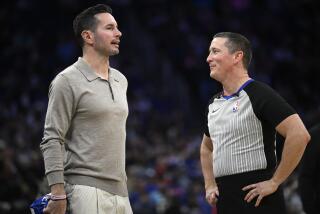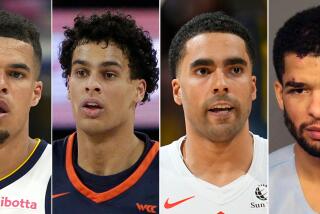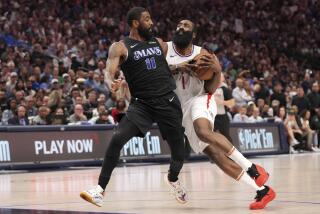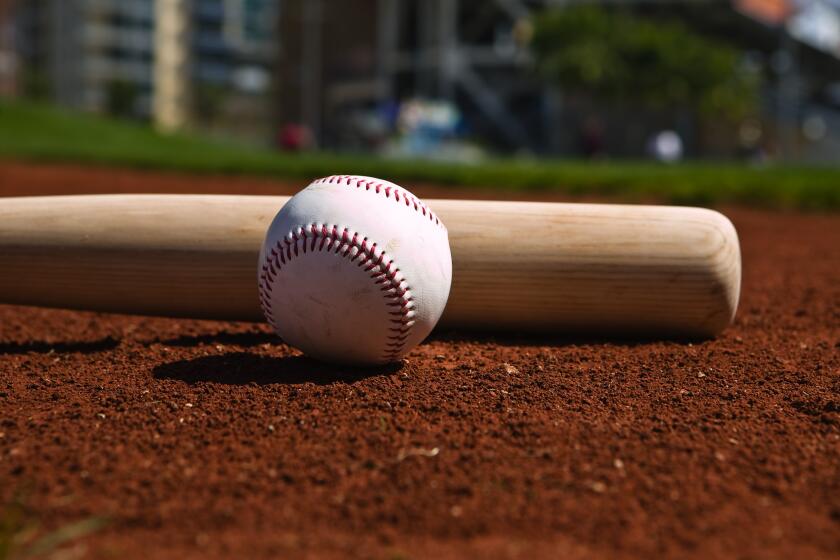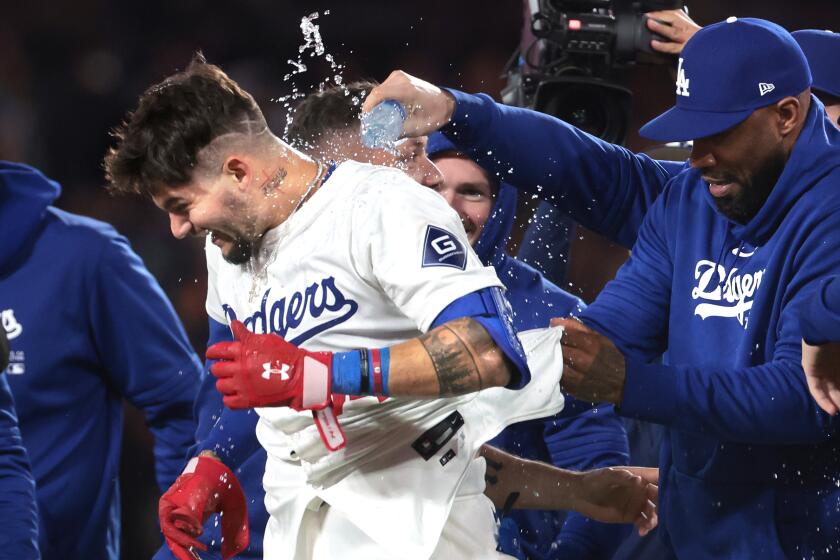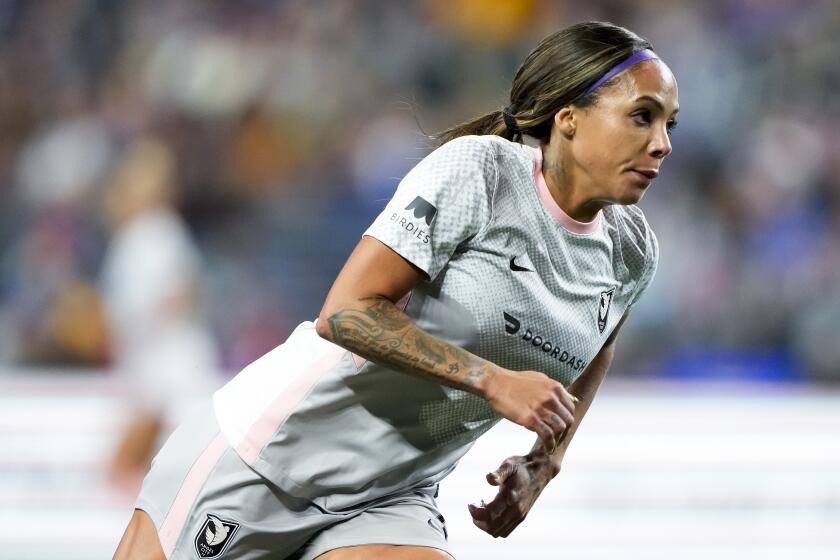Green Badge of Courage : If You’re Not From Augusta, It’s Expensive to Get In, but Some Have Managed Over the Years
Every year it’s a leap of faith for Buddy Whitfield or, this year, half a leap.
It’s a time for reminiscing for Bertha Carswell, and perhaps a time of sadness.
It’s business as unusualfor Top Center Ticket Service in Washington, because we aren’t talking about seats for “Cats” here.
We’re talking about diamonds, or their equivalent. Many a marriage has started with a rock cheaper than the price of admission to Augusta National for this week’s Masters.
It’s the toughest ticket in sports.
The Super Bowl? You could have had a ticket for $1,000 in New Orleans, maybe $1,500 for a seat between the 40s.
Final Four? A seat at Indianapolis this year for the championship game cost $300-$400 on the street or through a broker.
Indianapolis 500? World Series?
No contest.
The Masters? You can get one, but it’s going to cost you--plenty.
The price in the Top Center brochure is $4,100 a person for a party of four. That includes a ticket, rented house for a week and a round of golf at a course that certainly isn’t Augusta National.
The ticket is actually a plastic badge the size of a credit card, which seems appropriate, somehow.
Don’t want the house? Just send $2,650 for the badge.
“I’d snap it up,” said one Augustan, who asked that his name not be used. “Last year, I heard one guy paid $4,500 just for the ticket.”
Carswell, a retired schoolteacher in Augusta, has four and she pays the face value, $100 each. She remembers her first Masters, which was the first, in 1934, when tickets were $5.
“We would drive right up to the front of the house that’s the clubhouse now,” she says. “It was a private home then. And we would pay $5 for our tickets, and it was good for Sunday before the tournament, through the practice days and then the tournament itself. And we would park on Magnolia Lane, alongside the magnolia trees.”
Even Greg Norman doesn’t park alongside the magnolia trees these days.
And practice tickets are $16 for each of the first two days, $21 for Wednesday. They are also sold by application, and fewer than 20% of those who apply get tickets.
Carswell attended every Masters until 1989, when she suffered a stroke that keeps her away. She still has her memories of Masters past, and of people passed.
And she still has her tickets.
“I give them to my family,” she says. “I know one year my nephew from the university [of Georgia] in Athens came with some of his fraternity brothers, and some of them had counterfeited some tickets with plastic.”
They were caught, she says. Seems that nobody realized that the hologram on the ticket made counterfeiting beyond their ken.
“I asked him, ‘Did you get involved in that?’ ” Carswell says. “And he said, ‘No, ma’am, because I know my mom and dad would kill me if you came off that list.’ ”
The list has the names of those who are entitled to buy Masters tickets every year. Officials at Augusta National do not care to discuss tickets, thank you, but the best estimate is that about 30,000-35,000 of them are distributed each year, and that fewer than 15,000 people are on the list to buy the tickets, most owning the rights to more than one.
Many are Augustans, who were called on in the early days of the tournament to pony up as a civic gesture.
Tickets may transfer from husband to wife in case of death, but no farther down the generational line.
Wink, wink.
“I think they read the Augusta Chronicle obituaries to make sure,” Carswell says, laughing.
The folks at Augusta National are secretive and defensive about tickets. They are constantly under assault by Augustans, who figure too many of the badges are going to chief executive officers of New York companies by hook or by crook. F.O.C., Augustans call them. Friends of Cliff, who is Cliff Roberts, the late New York businessman who founded the Masters with Bobby Jones.
And they are under pressure from thousands who can buy tickets for any event, except the Masters.
“We’re not the ticket Gestapo,” says Glenn Greenspan, an Augusta National spokesman.
Maybe not, but the people on the list are asked to sign an agreement that the tickets are not for resale. And Georgia has a no-scalping law.
Wink, wink.
The last time you could buy a ticket over the counter was 1967.
By then Arnold Palmer had won three Masters and Jack Nicklaus three.
“Arnold Palmer came along and won and Jack Nicklaus won, and Arnie’s Army started buying all the tickets,” says Whitfield, a real estate broker from Durham, N.C.
Augusta National stopped putting names on the waiting list in 1978, when it became plain that nobody after that was going to get a ticket in the foreseeable future.
By then, Whitfield had been on the waiting list for four years but had been going to Augusta since 1955, when tickets weren’t a problem.
His father-in-law, vice president of a supermarket chain, got them from an Augusta meat canner, Clem Castleberry, who had plenty. But then Castleberry died, and Palmer started winning and the tickets dried up.
And Whitfield was hooked.
“The azaleas, the camelias, the dogwoods. Once you go, you get addicted to Augusta National,” he says. “And then I started taking my children. It was like Christmas for us, four or five of us going to Augusta every year.”
Without tickets.
Whitfield went on faith, figuring that somehow he would find a way to get tickets, and that faith was generally rewarded through the barter system. Every year, he would pile kids and country hams in his car and take off to Augusta, where hams bought tickets.
Somehow it always worked, especially when he hooked up with a woman who had control of two tickets and didn’t like crowds. “That lady I kept in country hams, in Harry and David’s fruits-of-the-month, in cards and presents on her birthday and special occasions,” Whitfield says.
“And then her family found out what she was doing and told her they wanted the tickets.”
Back in the market, pointing to children and imploring anyone with a ticket to send this child to the Masters. Once he traded his driver’s license and a credit card to a Baptist preacher, who had an available ticket but not necessarily abiding faith in his fellow man.
At day’s end, the license and credit card went back to Whitfield, and the badge went back to the preacher, along with a topic for his Sunday sermon.
“He told me he was going to preach about me,” Whitfield says, laughing. “I’ll bet he did too.”
For years the barter went on, and for years Whitfield would send a letter to Augusta National, reminding whom it may concern that he was still interested in buying tickets. There is turnover, after all. People die. A few get caught violating the no-resale policy.
Four years ago, Whitfield’s annual letter was answered by an application for two tickets, at $100 each.
“I felt like I won the lottery,” he says. “It had been so long.”
So today he sets out from Durham, two tickets in hand but four heads in the car. The children are grown now, but, like their father, they need an Augusta fix.
“I have a way to get the other two,” Whitfield says, laughing, “and I ain’t going to tell you how.”
They will come. They always do, and not for $4,100 or even $2,650.
But some will pay that and more.
After all, it’s the toughest ticket in sport.
More to Read
Get our high school sports newsletter
Prep Rally is devoted to the SoCal high school sports experience, bringing you scores, stories and a behind-the-scenes look at what makes prep sports so popular.
You may occasionally receive promotional content from the Los Angeles Times.
